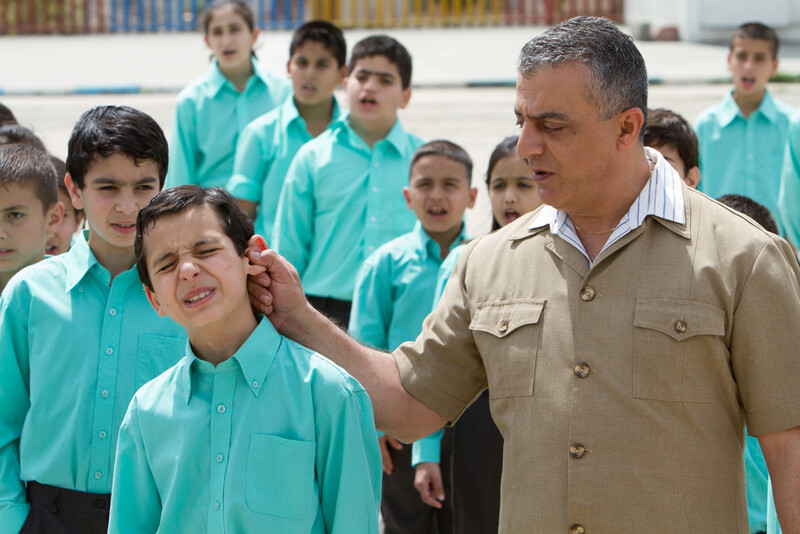The Electronic Intifada 30 June 2015

Palestinian citizen of Israel Eyad is the only non-Jewish pupil at his boarding school.
Strand ReleasingDancing Arabs, directed by Eran Riklis
This is a film about what happens when Eyad, a Palestinian citizen of Israel, becomes the only non-Jewish pupil at a boarding school in Jerusalem.
The movie is based on the first of three novels by Sayed Kashua, a Palestinian who writes a regular column for the Israeli newspaper Haaretz. In July of last year, following the high-profile killings of Palestinian and Israeli children and shortly before Israel’s 51-day bombardment of Gaza, Kashua caused a stir when he wrote that he was leaving Jerusalem because the “lie I’d told my children about a future in which Arabs and Jews share the country equally was over.”
The film is directed by Eran Riklis, a Jewish Israeli, whose previous works include The Syrian Bride and Lemon Tree. Dancing Arabs, which sometimes goes by the title A Borrowed Identity and made its world premiere in 2014, is currently showing in Canadian theaters and will be released in the United States this summer.
Second class citizen
The film centers around the barriers Eyad faces in Jerusalem. He becomes close friends with Yonatan and clandestinely dates Naomi, both of whom are Jewish Israelis.
But Israeli society as a whole treats him as a second class citizen.
At school, bullies taunt him with racist songs about the Prophet Muhammad. He is mocked for the accent with which he speaks Hebrew. An Israeli soldier hears Eyad speaking Arabic on a Jerusalem street, detains him and confiscates his identity card.
Dancing Arabs makes clear that Eyad’s experiences are common for Palestinian citizens of Israel, a group that is collectively oppressed. When Eyad is held by the soldier in Jerusalem, he joins several other Palestinians who are being held without clear reasons.
Salah, Eyad’s father, was accused as a youth of planting a bomb in a bus station. Without due process, Salah was sentenced to two years in jail followed by one year of house arrest. He was also prevented from returning to Jerusalem to continue his studies.
In Tira, the Palestinian town where Eyad is from, the school is run down and tiny whereas the school he attends in Jerusalem is massive and modern. Similarly, the homes of Naomi and Yonatan are much nicer than any of those belonging to Palestinians depicted in the film.
At the school in Jerusalem, the history of Israel’s foundation is taught in a manner that vilifies Palestinians. There is no acknowledgment of the Nakba (“catastrophe” in Arabic), the 1948 ethnic cleansing of Palestine.
When Eyad works in the Jerusalem restaurant industry, he learns that jobs waiting tables are mainly given to Jewish people, whereas Palestinians are consigned to less desirable jobs in the kitchen.
Moreover, the threat of violence against Palestinians living in Israel is omnipresent. Devotees of Meir Kahane, an ultra-racist rabbi, march through the streets.
When Eyad calls Naomi from Silwan, a Palestinian neighborhood of occupied East Jerusalem, there is a sticker on the payphone that warns Arabs to stay away from Jewish women.
Equal status?
The film is also an amusing satire of “normalization” — projects promoting cooperation between Israeli Jews and Palestinians, without addressing the inequalities between them.
An American pushing such an endeavor visits Eyad’s school and has the children sing feel-good songs. This portion of the film is presented as a farce. The American is portrayed as stereotypically naïve. He is visiting the Middle East in 1982 — at a time when the Israeli military is slaughtering Palestinian and Lebanese people.
A scene in which Eyad brings a Jewish boy to his home as part of a normalization effort is similarly comical. Because Eyad doesn’t understand the connotation of the word “terrorist,” he boasts to the Jewish boy that his father is a terrorist. The boy spends the rest of the visit terrified and the film plays this for laughs.
This is Dancing Arabs’ achievement: it suggests that the Israel-Palestine question requires bold political solutions rather than cultural or individualistic ones. The film does so by structuring itself around major political events: Israel’s 1982 invasion of Lebanon, the first intifada and the Gulf War.
Framing the film in this way points to the overpowering effects that state violence has on ordinary people. A similar end is achieved by the way that the personal relationships between Palestinian and Israeli characters lead to harm rather than harmony.
This point is made in a scene where Eyad is facing multiple crises and, looking reflective and full of despair, he listens to the Joy Division song “Love Will Tear Us Apart.” Ultimately the love he shares with Naomi helps precipitate Eyad’s downfall. His friendship with Yonatan, meanwhile, enables the erasure of Eyad’s identity as a Palestinian.
Dancing Arabs demonstrates that, as Kashua writes in that famous Haaretz article, it is grossly misguided to believe that Jewish and Palestinian citizens of Israel have equal status. Kind, smart, hard-working people like Eyad are ground down and their aspirations are frustrated simply because they are Palestinian.
The film suggests that this situation cannot be resolved by normalizers or by benevolent Jewish Israelis. It can only be resolved by tackling the systematic discrimination that Israel inflicts on Palestinians.
Dr. Greg Shupak is a writer and activist who teaches Media Studies at the University of Guelph. He lives in Toronto, Canada.





